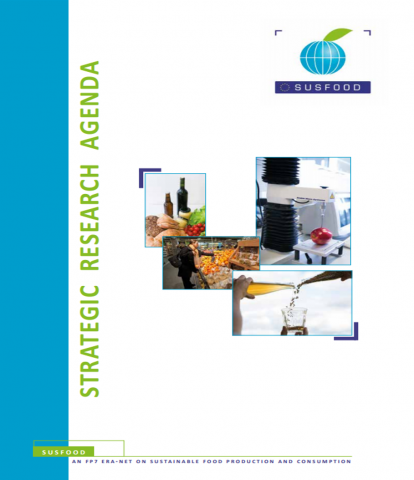|
Download SRA by clicking on the figure |
SUSFOOD, the predecessor of SUSFOOD2, developed a strategic research agenda to provide guidance for future research into sustainable food production. SUSFOOD has the vision: All food chain partners contribute to achieving sustainable*, secure and resilient food systems which feed the world and make sustainable choices the easy and preferable choices for consumers. *SUSFOOD defines sustainability in the food area as: "A food system that supports food security, makes optimal use of natural and human resources and respects biodiversity and ecosystems for present and future generations, which is culturally acceptable and accessible, environmentally sound and economically fair and viable, and which provides the consumer with nutritionally adequate, safe, healthy and affordable food". |
The SUSFOOD Strategic Research Agenda (SRA)
The SUSFOOD SRA embraces sustainability within a global context. The global food system is challenged by increased demand for quantity and quality of food to meet the population growth of 7 billion today to 9 billion by 2050, and at the same time to meet changes in the socio-economic and demographic structure of the population. These challenges include an increased middle income group demanding more protein-rich food; increased pressure on the natural resources, like water and energy; climate changes; demand for more nutritious and safe food for all; and for food to be affordable by all. The food and drink sector contributes to the global economy and job opportunities. In 2011, the food and drink industry generated in Europe an annual turnover of 1,017 billion euros and generated 4.25 million jobs. This makes it the largest manufacturing sector in Europe.
The SUSFOOD SRA takes into account other relevant SRAs for sustainable production and consumption, why this SRA focus on food chain sustainability beyond the farm gate or beyond the fishing boat, e.g. processing, packaging, transport, retailing, food services, storage and consumer activities. However, SUSFOOD reaches out to the primary production on issues as methods and metrics for assessment and policies.
The SUSFOOD SRA strives to have the highest impact on
- i) food security,
- ii) pressure on natural resources as water and energy adapting to climate change,
- iii) innovation and knowledge transfer,
- iv) food and health and
- v) sustainable food economy, including employment and job creation.
The SUSFOOD strategy and the eight research areas
The strategy for how research can have an impact to address these core challenges has a multipronged approach. This includes establishment of a Meta Knowledge Database (MKB), providing information on funding and research institutions, recent and ongoing research programmes and an identification of the following eight key research areas where research gaps exists:
- Public policy coherence
- Innovation in food processing technologies
- Redesign input, waste and side flow strategies to increase resource efficiency and provide added value in food products and processing, manufacture etc.
- Interdisciplinary research approach to innovative of food products and use of new raw materials for food products
- Harmonisation of the methods and metrics for integrated assessment of sustainability of food products and food patterns
- Connection between stakeholders and food systems
- Understanding of consumer behavior and food choices
- Integration of information systems for personalized and sustainable choices
Each research area is broken down into a number of concrete research subjects.
The eight research areas should be seen in a holistic manner, as outcome of each research area may challenge other research areas. To stress the importance of a holistic approach, the SRA points at the cross-cutting issues:
- i) localisation of activities and
- ii) equity and ethics,
which both need to be addressed as an integral part of each research area.
The implementation of the SRA was initiated by two SUSFOOD calls, maintenance of the MKB, dialogue with national institutions; private as well as governmental, and with EU institutions. And will continue in the H2020 ERA-Net Cofund SUSFOOD2 (2017-2021).
